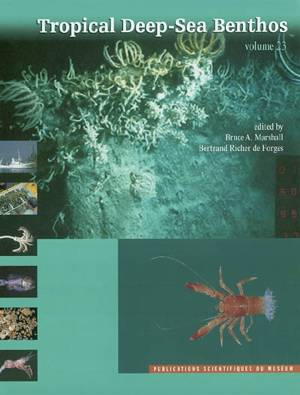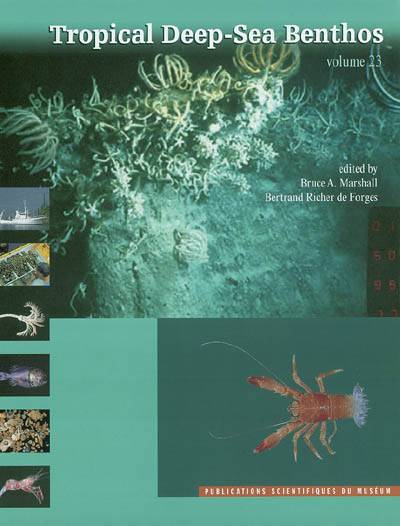
- Retrait gratuit dans votre magasin Club
- 7.000.000 titres dans notre catalogue
- Payer en toute sécurité
- Toujours un magasin près de chez vous
- Retrait gratuit dans votre magasin Club
- 7.000.0000 titres dans notre catalogue
- Payer en toute sécurité
- Toujours un magasin près de chez vous
Tropical deep-sea benthos. Vol. 23
Volume 23
Description
The deep benthos of the tropical seas represents one of the last frontiers of marine biodiversity, and recent deep-sea exploration confirms the Indo-Pacific as a major reservoir of unknown forms of life in all taxonomic groups. However, unlike most other tropical biological communities, the deep-sea benthos has suffered from a lack of focussed attention from zoologists and oceanographers. Tropical Deep-Sea Benthos,a continuation of Résultats des Campagnes Musorstom, is a series dedicated to inventorying and describing the deep-sea faunas of the world, with special emphasis on the most extensive of its biogeographical regions: the Indo-Pacific.
The series depends on an international network of taxonomists fueled by the results of an ongoing sampling programme by Muséum national d'Histoire naturelle (MNHN, Paris) and Institut de Recherche pour le Développement (IRD, formerly ORSTOM).
Volume 23 of Tropical Deep-Sea Benthos contains 9 contributions by experts from Great Britain, Japan, Russia, Spain, Taiwan, the United States, and France. There is one paper each on hexactinellid sponges, pycnogonids, flatfishes, and 6 on decapod crustaceans which are a recurrent speciality of the Tropical Deep-Sea Benthos series. Of the 226 species reported, described and illustrated in the present volume, no less than 82 (36%) are new. Of particular interest in this volume is the review of Sympagurus hermit crabs, some of which live in symbiosis with sea-anemones or zoantharians than can produce pseudo-shells. Armored deep-sea shrimps of the genus Glyphocrangon are revealed to be far more diverse than previously appreciated, with their total number more than doubled as the result of the present study, and examination of galatheids from Fiji and Tonga confirms the south-west Pacific as the center of species richness for these crustaceans. The improbable colour patterns of shrimps of the genus Plesionika, some of which with brilliant target-like markings, are illustrated in colour plates and one of them adorns the cover page of this volume.
Spécifications
Parties prenantes
- Editeur:
Contenu
- Langue:
- Français
- Collection :
- Tome:
- n° 23
Caractéristiques
- EAN:
- 9782856535578
- Date de parution :
- 30-04-04
- Format:
- Livre broché
- Dimensions :
- 220 mm x 280 mm
- Poids :
- 2300 g

Les avis
Nous publions uniquement les avis qui respectent les conditions requises. Consultez nos conditions pour les avis.





